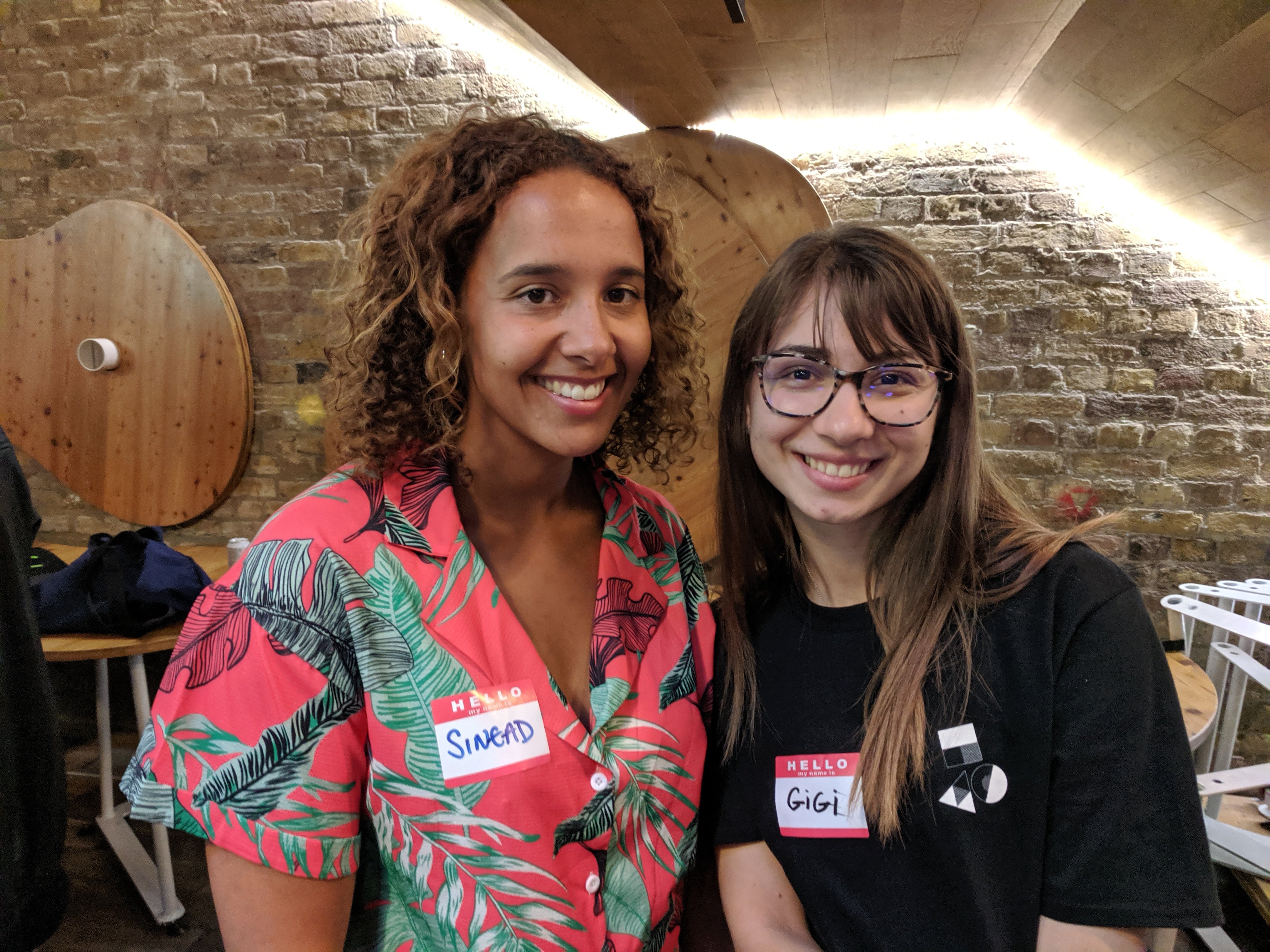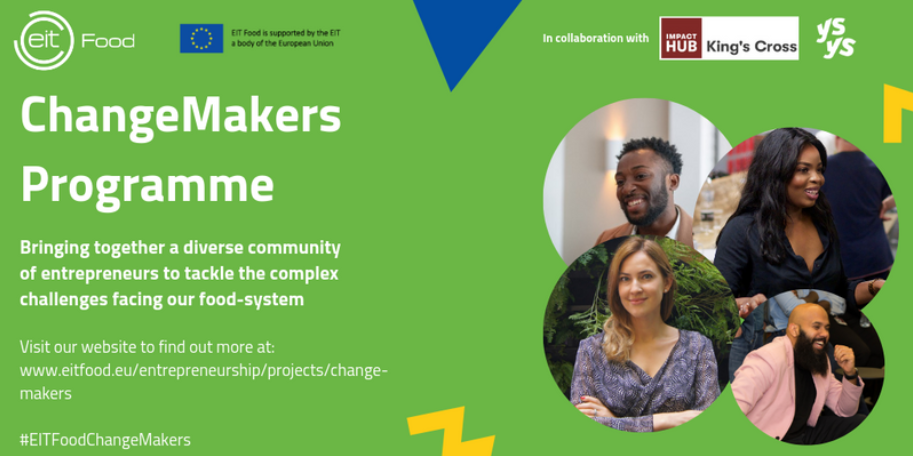How entrepreneurship is vital for the future of our food system
Roberta Iley, Principal Change Designer at Forum for the Future and keynote speaker for EIT Food’s Change Maker event on food and sustainability, shares her thoughts on the power of food entrepreneurs ahead of the Change Makers Startup Weekend, led by EIT Food, YSYS and King’s Cross Impact Hub.
At the Change Makers Startup Weekend, 4-6th October, entrepreneurs can learn more about food system issues, develop viable business ideas, find potential co-founders and pitch for €10,000 worth of support. The application deadline is 1st September 2019.

The challenges facing our food system
Wherever you are in the world, there’s no doubt that the food system is transforming quickly around you to meet changing global demographics and food consumption trends.
For example, in only three decades, China’s food system has moved from one based on rationing and grain coupons to one characterised by increasing meat consumption, rising prices and growing concerns about food quality and safety.
In Western Europe, we’re seeing the huge rise in plant-based diets in response to concerns about the carbon emissions produced from the production of animal products, as well as health concerns around non-communicable diseases such as cancer.
Systems thinking and the ‘butterfly effect’
These macro trends, when looked at from a systems perspective, cause a ‘butterfly effect’ of unintended consequences. For instance, the distrust of domestic dairy brands among Chinese consumers, due to the melamine-tainted milk scandal of 2008 when regulation was slow to catch up with the changing market, has led to a surge in demand for Australian baby formula and consequently a “baby formula crisis” in Australia itself.
Then there’s the star of the clean eating movement, linked to a growing appetite for plant-based diets: the avocado. This previously humble fruit is shipped over from Mexico, South America, Africa and beyond to satisfy our whims on the back of the latest food trend. This places unprecedented demand on avocado farmers and pushes up prices to the point where there are even reports of Mexican drug cartels controlling these lucrative exports. Forests are being thinned out to make way for avocado plantations, whilst intensive farming on this scale contributes to greenhouse emissions and places pressure on local water supplies.
Seen from the vantage point of any of these unintended effects, avocado starts to sound like less of an appealing breakfast option. Were we wrong to diversify our diets by eating less meat to help tackle climate change? Of course not. But in making these shifts we can’t lose sight of the end goal to deliver better sustainability and nutrition outcomes on the ground.
Food entrepreneurs are key to connecting health and sustainability
It’s this ‘interconnectedness’ between sustainability and nutrition goals that is paramount in the food community, and this is where there is huge potential for entrepreneurs to really shine. Systems thinking is absolutely critical to getting us where we need to be as fast as possible.
Take regenerative agriculture as a great example of a systemic solution. It’s been predicted by the UN and others that we have 60 harvests left. Essentially, that means 60 years of food! By focusing on using farming methods that build health back into the soil and shift mindsets to driving positive impact instead of just reducing harm, regenerative agriculture solves several issues at the same time. It increases the long-term productivity of soils and thus secures food supply while ensuring more nutritional value from growing food in healthier soil. This distributes profit from selling the food more evenly across the value chain so that farmers can enjoy fairer wages and better livelihoods.
Then there’s models like Kipster Farms set up in the Netherlands. They’ve created a best practice working farm which raises (and packages and sells) chickens in the most environmentally and ethically sound way possible. It does so while educating people about the food that they eat and pricing it so that its value is understood and rewards everyone fairly. It’s an interesting example of an initiative that’s bringing together many issues at once.
It’s not just poultry that needs to be produced more sustainably. Palm oil has received media attention for its negative impact on the environment. Boycotting products with palm oil may seem like the obvious solution in the face of fast-paced deforestation in South-East Asia. Yet a shift to alternative oils may simply drive worse land-use change as, in the case of oil palms, these crops are five times more productive than soy. Taking a holistic view, perhaps supporting new models for palm oil production and fundamentally re-assessing our use of oils in food products or for biodiesel - may help us to get further, faster.
There’s real space right now for entrepreneurs to completely rethink things and give us a vision for what the future could look like. Let’s face it – parts of our food system are built on very old, colonial economic systems that were never set up to reward growers fairly for the extremely valuable job that they do: managing our land. As custodians of this increasingly precious asset, their jobs become more and more crucial with every passing day as the effects of climate change become more acute.
Rethinking ‘value’ when it comes to food
Connected to this, our food pricing as a whole is not based on its real value. If we could find a way of understanding the true cost of food and incentivising better choices, such as making vegetables cheaper and more desirable than unhealthy, cheap processed carbohydrates we would see both better wages for the farmers and better eating patterns. How can we make our food production system more transparent and fairer while ensuring access to healthy food for the everyone across the globe?
We’re seeing some interesting movement in the introduction of ‘Living income’ benchmarks - where the economic and social cost of producing food gets costed in and accounted for when it comes to food pricing - but we need more disruptive products, services and initiatives challenging the status quo to make our system fairer, more resilient and ecologically sound. Again, that’s where entrepreneurs can make a huge contribution.
The Change Makers programme: creating a future-proof food system
Our current food system does a great job at what it was designed to do - produce as much food, for as little money as possible. But that is no longer enough. There needs to be a radical shift to a system that is guided by what nutrition we can produce sustainably on existing agricultural land if we are to meet the needs of 10 billion people by 2050 in a way that doesn’t bring us way over our carbon targets.
There is hope that programmes like EIT Food’s Change Makers can help to achieve the paradigm shifts we need by encouraging smaller, more disruptive startups to challenge our current practices to find radically different product and food production offerings for a fair, healthy and sustainable food system. Change Makers’ focus on supporting entrepreneurs from diverse backgrounds is pioneering and important - we will only get to where we need to be if we encourage fresh perspectives.
By bringing some new voices in, we can lessen the noise of our own echo chambers and move forward, together - collaborating across sectors to ensure that our approaches to producing and distributing food are healthy, sustainable and fair.

The EIT Food Change Makers Programme is a new, collaborative initiative between EIT Food, YSYS and King’s Cross Impact Hub which gives diverse talent the chance to become agrifood-tech innovators and entrepreneurs through a series of events, mentorship and training.
We’re looking for ambitious individuals from underrepresented groups - such as women, non-binary, Black, Asian and minority ethnic and LGBTQI community - who are interested in launching a startup in this sector or joining a team to get involved.
Entrepreneurs can apply for one of the limited spaces at the Change Makers Startup Weekend on 4-6th October at King’s Cross Impact Hub, London. Here where they can learn more about food system issues, develop viable business ideas, find potential co-founders and pitch for €10,000 worth of support. The application deadline is 1st September 2019. Find out more here.
Forum for the Future is a leading international sustainability non-profit with offices in London, New York, Singapore and Mumbai. It specialises in addressing critical global challenges by catalysing change in key systems. Follow them @Forum4theFutur
More blog posts

From Pitch to Plate: How Football Is Addressing Food Waste

